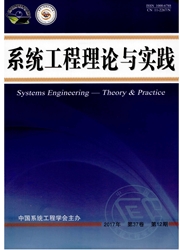

 中文摘要:
中文摘要:
羊群行为是否加剧股票价格波动,已有研究甚至给出截然相反的结论.假定交易者买卖观点的转变主要受其对股票基础价值认知和其他交易者行为的影响,本文构建描述市场平均投资态度和股票价格变化的数学模型,利用离散动力系统的相关理论研究模型的稳定性,并根据金融市场稳定与否对羊群行为程度进行界定.研究结果表明,在轻度羊群效应区间内,股票价格相应地呈现微幅周期波动;在中度羊群效应区间内,股票价格在经历一段时间的阻尼式波动后收敛至均衡价格.并且在此区间中存在最优的羊群行为,它促使股票价格以最快的速度逼近均衡价格;而在重度羊群效应区间,股票价格发生大幅的非理性波动,可以导致股市严重泡沫和金融危机的产生.
 英文摘要:
英文摘要:
Research results have even given the opposite conclusions on whether herd behavior increase stock price volatility. Assume that the change of view for traders buying or selling is mainly affected by their cognitive ability for the basic value of stock and other traders' behaviors. This paper constructs a mathematical model describing the change of market average investment attitude and stock prices, and analyzes the stability of the model by using the related theory of discrete dynamic system, and defines the degree of herding behavior according to whether the financial market is stable. The results indicate that: in mild herding effect interval, stock prices accordingly present periodic micro-amplitude fluctuations; in moderate herding effect interval, after experiencing a period of damping volatility, stock prices convergence to equilibrium, and there exists an optimal degree of herding behavior which encourages the stock price to approach equilibrium in the fastest speed; in severe herding effect interval, stock prices irrationally sharply fluctuate in large amplitudes which can lead to severe stock market bubble and the financial crisis.
 同期刊论文项目
同期刊论文项目
 同项目期刊论文
同项目期刊论文
 期刊信息
期刊信息
